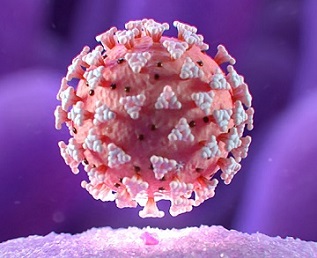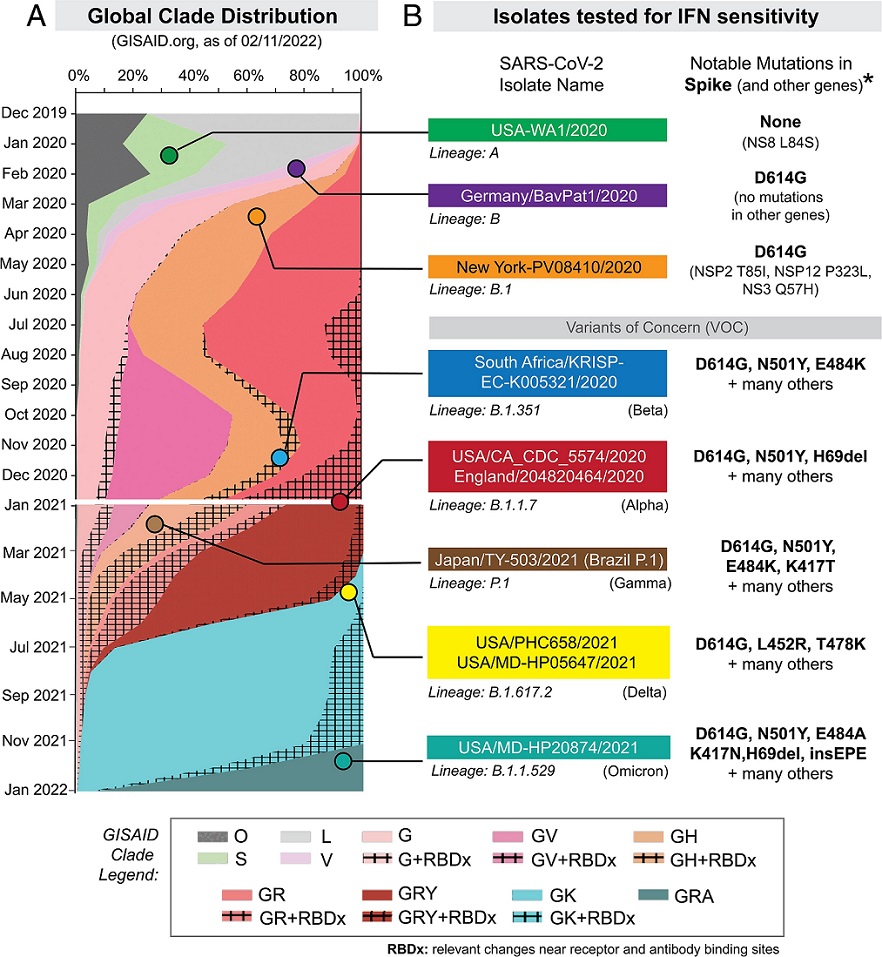BREAKING! University of Colorado Study Finds That SARS-CoV-2 Virus Is Evolving To Evade Innate Responses And Interferons!
Source: Medical News -SARS-CoV-2 Evolving To Evade Interferons Jul 26, 2022 3 years, 7 months, 23 hours, 11 minutes ago
A new study by scientist from University of Colorado Anschutz Medical Campus-USA has worryingly found that the SARS-CoV-2 coronavirus is actually evolving to evade innate immunity responses and interferons.

The constant emergence of various SARS-CoV-2 variants with enhanced transmissibility, pathogenesis, and resistance to vaccines presents urgent challenges for curbing the COVID-19 pandemic.
Although spike mutations that enhance virus infectivity or neutralizing antibody evasion may drive the emergence of these novel variants, studies documenting a critical role for interferon responses in the early control of SARS-CoV-2 infection, combined with the presence of viral genes that limit these responses, suggest that interferons may also influence SARS-CoV-2 evolution.
The study team compared the potency of 17 different human interferons against multiple viral lineages sampled during the course of the global outbreak, including ancestral and five major variants of concern that include the B.1.1.7 (alpha), B.1.351 (beta), P.1 (gamma), B.1.617.2 (delta), and B.1.1.529 (omicron) lineages.
The study findings shockingly revealed that relative to ancestral isolates, SARS-CoV-2 variants of concern exhibited increased interferon resistance, suggesting that evasion of innate immunity may be a significant, ongoing driving force for SARS-CoV-2 evolution.
The study findings also have implications for the increased transmissibility and/or lethality of emerging variants and highlight the interferon subtypes that may be most successful in the treatment of early infections.
The study findings were published in the peer reviewed journal: Proceedings of the National Academy of Sciences-USA.
https://www.pnas.org/doi/full/10.1073/pnas.2203760119
The study team are among the first to have investigated how antiviral proteins called interferons interact with SARS-CoV-2, the cause of COVID-19.
The research focuses on how the innate arm of the immune system defends against this coronavirus. The work resulted from a collaborative effort by multiple scientists, including the laboratories of Dr Mario Santiago, PhD, associate professor of medicine and Dr Eric Poeschla, MD, professor of medicine, both at the University of Colorado School of Medicine.
Although the adaptive arm of the immune system responds definitively to infection by generating antibodies and T cells, the innate arm forms an earlier, first line of defense by recognizing conserved molecular patterns in pathogens.
Co-researcher Professor Dr Eric Poeschla told Thailand
Medical News, “The SARS-CoV-2 coronavirus just recently crossed the species barrier into humans and continues to adapt to its new host. Much attention has deservedly focused on the virus's serial evasions of neutralizing antibodies. The virus seems to be adapting to evade innate responses as well."
 quot;>Selection of SARS-CoV-2 strains for IFN sensitivity studies. (A) Global distribution of SARS-CoV-2 clades. GISAID.org plotted the proportion of deposited sequences in designated clades against collection dates. The 10 isolates chosen are noted by colored dots. (B) SARS-CoV-2 strains selected for this study included representatives of lineages A, B, B.1, B.1.351, and B.1.1.7 (SI Appendix, Table S1). Lineage P.1 (which branched off from lineage B.1.1.28), B.1.617.2, and B.1.1.529 were added after the initial preprint submission and were evaluated for IFNβ and IFNλ1 sensitivity. Lineage B isolates encode the D614G mutation associated with increased transmissibility. *Amino acid mutations were relative to the reference hCOV-19/Wuhan/WIV04/2019 sequence.
quot;>Selection of SARS-CoV-2 strains for IFN sensitivity studies. (A) Global distribution of SARS-CoV-2 clades. GISAID.org plotted the proportion of deposited sequences in designated clades against collection dates. The 10 isolates chosen are noted by colored dots. (B) SARS-CoV-2 strains selected for this study included representatives of lineages A, B, B.1, B.1.351, and B.1.1.7 (SI Appendix, Table S1). Lineage P.1 (which branched off from lineage B.1.1.28), B.1.617.2, and B.1.1.529 were added after the initial preprint submission and were evaluated for IFNβ and IFNλ1 sensitivity. Lineage B isolates encode the D614G mutation associated with increased transmissibility. *Amino acid mutations were relative to the reference hCOV-19/Wuhan/WIV04/2019 sequence.
Typically, interferons are central molecules in the innate immune system that trigger a cascade of antiviral responses in cells within minutes of infection. As such, the interferon pathway could significantly reduce the levels of virus initially produced by an infected individual.
Co-researcher, Dr Mario Santiago further added, "Interferons are clinically viable therapeutic agents that have been studied for viruses like HIV-1 for years. Here we looked at up to 17 different human interferons and found that some interferons, such as IFNalpha8, more strongly inhibited SARS-CoV-2.”
He added, “Importantly, later variants of the SARS-CoV-2 coronavirus have developed significant resistance to their antiviral effects. For example, substantially more interferon would be needed to inhibit the omicron variant than the strains isolated during the earliest days of the pandemic."
More importantly, the study findings suggest that COVID-19 clinical trials on interferons…many of which are listed in clinicaltrials.gov…may need to be interpreted based on which variants were circulating when the study was conducted.
The study team says that future work to decipher which of SARS-CoV-2's multitude of proteins might be evolving to confer interferon resistance may contribute in that direction.
With growing emerging evidence showing that the SARS-CoV-2 is rapidly evolving to evade antibodies, T-Cells and interferons, the possibility of a very lethal strain emerging very soon is very likely and should be fun once it emerges.
For more on the
SARS-CoV-2 Continued Evolution, keep on logging to Thailand
Medical News.

